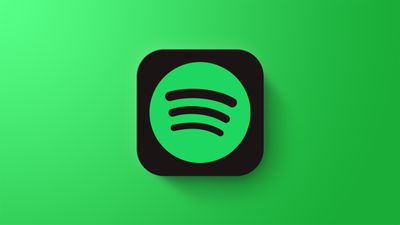Spotify Trials New Option to Turn Off Personalized Recommendations
Spotify is trialing a new ability for users to turn off their personalized recommendations, according to beta code unearthed by MacRumors contributor Aaron Perris.

Depending on how it works, the new option could conceivably allow users to prevent songs played on their account on behalf of other listeners from affecting their personalized recommendations. Either way, it is likely to be welcomed by Spotify users who aren't entirely satisfied with the success rate of the service's algorithms in matching new songs to their listening tastes.
Spotify's recommendation system combines a number of machine learning and AI-driven methods. The service's algorithm analyzes listening history, favorite genres, and the time of day that users listen to music, and bases its personal recommendations on these parameters. This process is combined with content-based filtering, which analyzes the audio of a song that a user interacts with, and takes into account characteristics like time signature, key, and tempo to recommend new songs with similar characteristics.
Spotify's recommendations system also uses something called collaborative filtering. For example, if two users have similar music tastes, Spotify might recommend songs one user has listened to but the other hasn't. However, this can end up with Spotify recommending more popular items more often than lesser known songs, resulting in an "echo chamber" effect, and for new users with no listening history it is next to useless.
It's not clear when the new option to turn off personal recommendations will appear for Spotify users, or whether the trial is region-specific. Spotify simply says it is "evaluating the ability," and thanks users for trying it out to help make Spotify better.
Apple is introducing a similar function for Apple Music subscribers in iOS 17.2, in the form of an additional Focus filter that can automatically turns off a user's Apple Music listening history. Apple's substantial software update is expected to land on iPhones in December.
Popular Stories
Apple hasn't updated the AirPods Pro since 2022, and the earbuds are due for a refresh. We're counting on a new model this year, and we've seen several hints of new AirPods tucked away in Apple's code. Rumors suggest that Apple has some exciting new features planned that will make it worthwhile to upgrade to the latest model.
Subscribe to the MacRumors YouTube channel for more videos.
Heal...
In 2020, Apple added a digital car key feature to its Wallet app, allowing users to lock, unlock, and start a compatible vehicle with an iPhone or Apple Watch. The feature is currently offered by select automakers, including Audi, BMW, Hyundai, Kia, Genesis, Mercedes-Benz, Volvo, and a handful of others, and it is set to expand further.
During its WWDC 2025 keynote, Apple said that 13...
Popular accessory maker Anker this month launched two separate recalls for its power banks, some of which may be a fire risk.
The first recall affects Anker PowerCore 10000 Power Banks sold between June 1, 2016 and December 31, 2022 in the United States. Anker says that these power banks have a "potential issue" with the battery inside, which can lead to overheating, melting of plastic...
Chase this week announced a series of new perks for its premium Sapphire Reserve credit card, and one of them is for a pair of Apple services.
Specifically, the credit card now offers complimentary annual subscriptions to Apple TV+ and Apple Music, a value of up to $250 per year.
If you are already paying for Apple TV+ and/or Apple Music directly through Apple, those subscriptions will...
Apple is developing a MacBook with the A18 Pro chip, according to findings in backend code uncovered by MacRumors.
Earlier today, Apple analyst Ming-Chi Kuo reported that Apple is planning to launch a low-cost MacBook powered by an iPhone chip. The machine is expected to feature a 13-inch display, the A18 Pro chip, and color options that include silver, blue, pink, and yellow.
MacRumors...
Apple's next-generation iPhone 17 Pro and iPhone 17 Pro Max are around three months away, and there are plenty of rumors about the devices.
Apple is expected to launch the iPhone 17, iPhone 17 Air, iPhone 17 Pro, and iPhone 17 Pro Max in September this year.
Below, we recap key changes rumored for the iPhone 17 Pro models:Aluminum frame: iPhone 17 Pro models are rumored to have an...
Apple is planning to launch a low-cost MacBook powered by an iPhone chip, according to Apple analyst Ming-Chi Kuo.
In an article published on X, Kuo explained that the device will feature a 13-inch display and the A18 Pro chip, making it the first Mac powered by an iPhone chip. The A18 Pro chip debuted in the iPhone 16 Pro last year. To date, all Apple silicon Macs have contained M-series...
Apple last month announced the launch of CarPlay Ultra, the long-awaited next-generation version of its CarPlay software system for vehicles.
There was news this week about which automakers will and won't offer CarPlay Ultra, and we have provided an updated list below.
CarPlay Ultra is currently limited to newer Aston Martin vehicles in the U.S. and Canada. Fortunately, if you cannot...






















